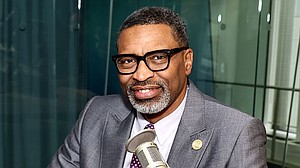3/11/2024

Black activists, political leaders and supporters of diversity, equity and inclusion programs are urging Black student athletes to boycott colleges and universities in states that have promoted or passed anti-DEI policies.
Their calls come as 81 anti-DEI bills that target programs at colleges have been introduced in 28 states and in Congress since the start of 2023, according to a tally by the Chronicle of Higher Education. Eight have been signed into law, in states, including Texas and Florida.
After the Florida Board of Governors banned public colleges from spending state funding on all DEI programs in January, the University of Florida made sweeping changes.
Earlier this month, the state’s flagship university announced that it had closed the office of its Chief Diversity Officer to comply with the Board of Governors’ directive.
In response, the NAACP sent a letter Monday to the attention of Charlie Baker, the President of the National Collegiate Athletic Association, imploring current and prospective student athletes “to reconsider any decision to attend, and compete at a predominantly White institution” in Florida.
The letter emphasized the value Black athletes often bring to collegiate sports programs.
“Florida’s dismantling of core representation and curricula is even more egregious when considering the all-too-often unseen business behind college sports,” the letter reads.
“Football, in particular, is more than a game — it’s a multi-billion-dollar industry, with most revenue earned off the backs of Black student-athletes.”
The NAACP’s letter also noted the importance of Black educators to the overall student experience.
Derrick Johnson, president and CEO of the NAACP, said in a statement accompanying the letter that DEI is “paramount (to) ensuring equitable and effective educational outcomes.”
“The value Black, and other college athletes bring to large universities is unmatched,” Johnson said.
“If these institutions are unable to completely invest in those athletes, it’s time they take their talents elsewhere.”
Last May, Florida Governor Ron DeSantis signed a law defunding DEI programs at state universities and colleges, calling them a “distraction from the core mission of public universities.” Texas Gov. Greg Abbott has also signed similar legislation banning DEI offices at state colleges, which has forced some campus programs at the University of Texas-Austin to stop providing services to students.
The NAACP letter came after other outspoken advocates for DEI penned messages to Black athletes in recent weeks, encouraging them to protest Florida’s anti-DEI laws or sign with schools in states that support DEI on college campuses.
Emmitt Smith, arguably the University of Florida’s most prominent alumnus with one of the most decorated careers in both the NCAA and NFL, released a statement on X last week, saying he was “utterly disgusted” with his alma mater’s decision to shutter its DEI office.
“We need diverse thinking and backgrounds to enhance our University and the DEI department is necessary to accomplish those goals,” Smith wrote.
“Instead of showing courage and leadership, we continue to fail based on systemic issues and with this decision, UF has conformed to the political pressures of today’s time,” he added. “To the MANY minority athletes at UF, please be aware and vocal about this decision by the University who is now closing the doors on other minorities without any oversight.”
Frank Harris, a professor who teaches diversity and equity in higher education at San Diego State University, told CNN that Black athletes have played a major role in helping predominately White schools establish a high profile in college athletics.
Many, including the University of Florida, have won national championships with star Black athletes on their team, he said.
“For me, in a lot of ways it’s hypocritical for an institution to benefit from Black talent and Black excellence in athletes and not have a similar investment in their success as students and as human beings,” Harris said. “And we know that diversity, equity and inclusion programs are really about serving the whole student. To make sure that they feel welcomed at an institution.”
Meanwhile, in Alabama, state lawmakers could soon pass a bill that also bans public funding for DEI programs at colleges and state agencies.
Birmingham Mayor Randall Woodfin said in a Feb.
21 Facebook post that he has “no problem organizing Black parents and athletes to attend other institutions outside of the state where diversity and inclusion are prioritized.”
“Student athletes and their parents have much more power than they realize,” Woodfin said in an emailed statement to CNN last week.
“These schools want to court top athletes? Well, they have to put that same energy in courting fairness and inclusion. If not, those athletes will go where they feel welcome, even if that means outside this state. It’s that simple.”
